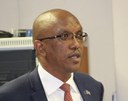As the proposed constitutional amendments to allow land expropriation without compensation is facing its first court challenge, Parliament now has another opportunity to deal with its legislative mandate’s great Achilles' heel – meaningful public participation. On November 15 after nationwide public hearings spanning over two months the Joint Constitutional Review Committee in Parliament adopted its report in favour of amending section 25 of the Constitution. Lobby group Afriforum however, launched a court application to have this report set aside citing serious concerns over the public participation process.
As Cosatu on Monday congratulated the President for signing the National Minimum Wage Bill into law, the Commission for Gender Equality (CGE) requested the bill to be returned to Parliament to be reconsidered. There has however, been no formal announcement from the Presidency that the bill was indeed signed into law. The CGE’s request follows serious concerns raised by the non-profit sector over the bill’s possible impact on the fate of care workers and other NPO staff. Despite concerns raised, certain government departments until now opted to follow a “wait and see” approach to what has been labelled an impending crisis for the non-profit (NPO) sector, and the women and children depending on its services.
The Socioeconomic Rights Project is happy to announce that Dr. Ngcime Mbano has joined the institute as a visiting scholar from 19 November 2018 for a period of three weeks.
The state manages billions of rands of taxpayers money, much of it meant for spending on social justice and development programmes. A system of public finance set in law governs how national, provincial and local governments should manage our public finances.
SALGA proudly announces the call for papers for the 2nd Research Colloquium which is now open. The colloquium will be hosted in partnership with the Dullah Omar Institute.
The state manages billions of rands of taxpayers money, much of it meant for spending on social justice and development programmes.
Statement by the Dullah Omar Institute, University of the Western Cape to the African Commission on Human and People's Rights at the 63rd Ordinary Session in Banjul, the Gambia ( 24 October - 13 November 2018).
The Dullah Omar Institute’s Children’s Rights Project has been admitted as an Amicus Curiae in a matter before the Constitutional Court concerning corporal punishment.
On 16 October 2018, Dr Tinashe Chigwata, launched his book titled “Provincial and Local Government Reform in Zimbabwe: An analysis of the Law, Policy and Practice”. The launch took place at the Local Government Investment Conference which took place this week in Bulawayo, Zimbabwe.
Across Africa, many people, especially the poor and other disadvantaged groups, are arrested and even detained for the transgression of minor offences, such as loitering, being a ‘rogue and vagabond’, use of abusive language, disorderly behaviour, begging, public insult and being idle. Many of these offences date back to the colonial-era. The Campaign on the Decriminalisation and Declassification of Petty Offences in Africa has as its aim reform in law, policy and practice that would address the arbitrary and discriminatory nature of these laws and by-laws and their enforcement.
The Auditor General, Mr Kimi Makwetu presented a keynote address to the second Joint DOI-UCT seminar on 12 of October 2018. The seminar theme was “Building a Capable Developmental State: Enforcing public finance law and ethics” .




![[Press Release] UWC Launches new research tool: Public Finance Watch [Press Release] UWC Launches new research tool: Public Finance Watch](https://admin.dullahomarinstitute.org.za/news/press-release-uwc-launches-new-research-tool-public-finance-watch/@@images/353114b4-a4a1-4b39-a071-77a96cc07a6e.png)



